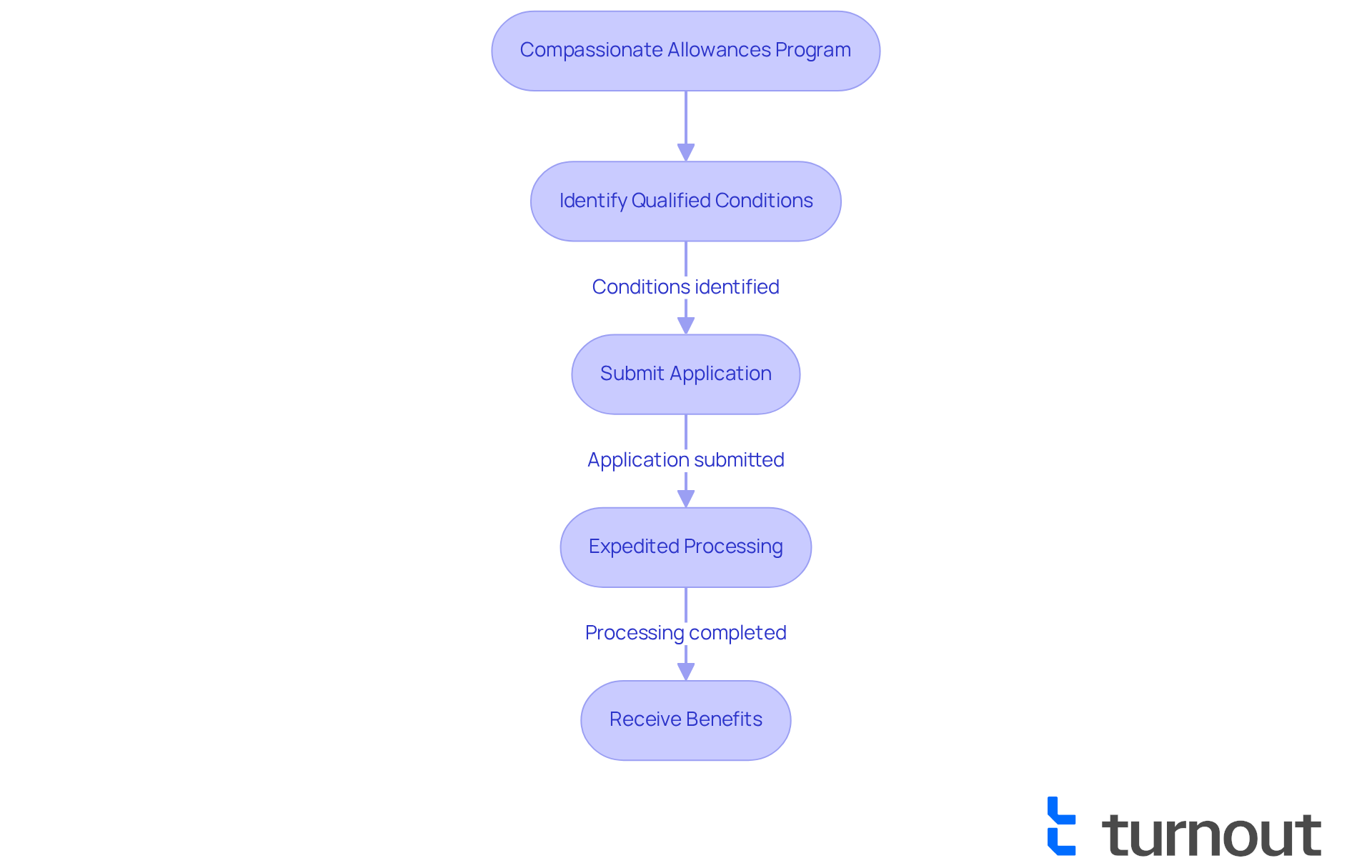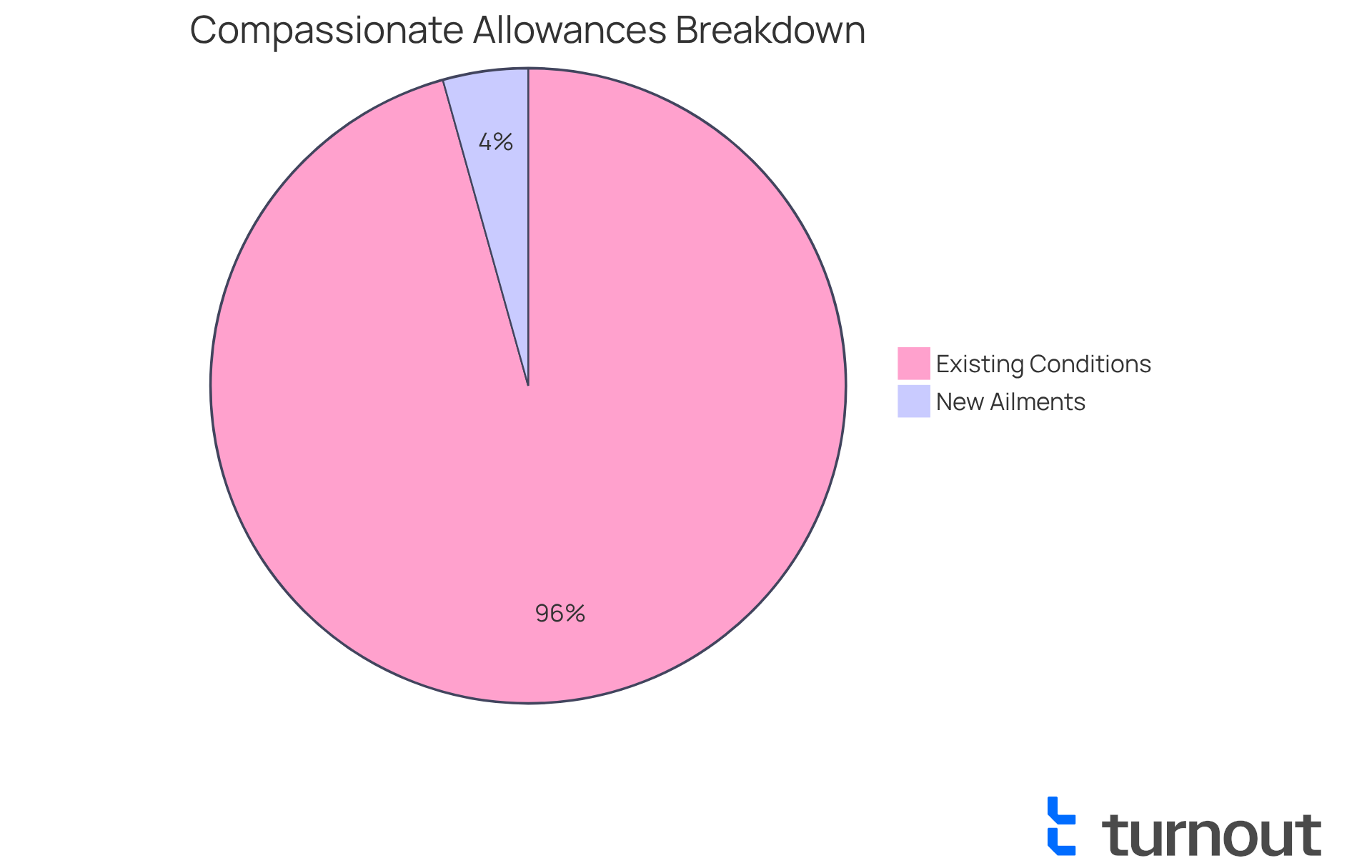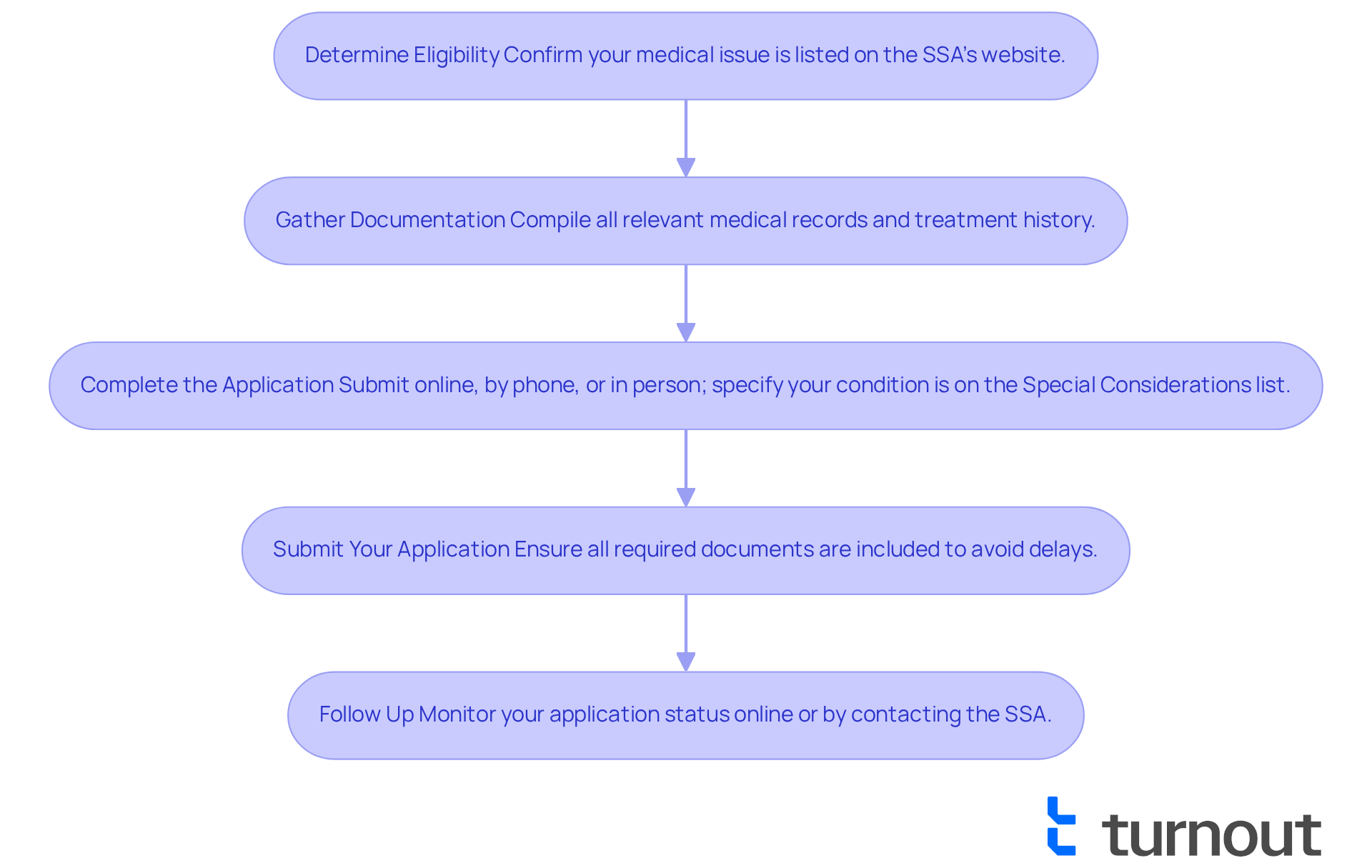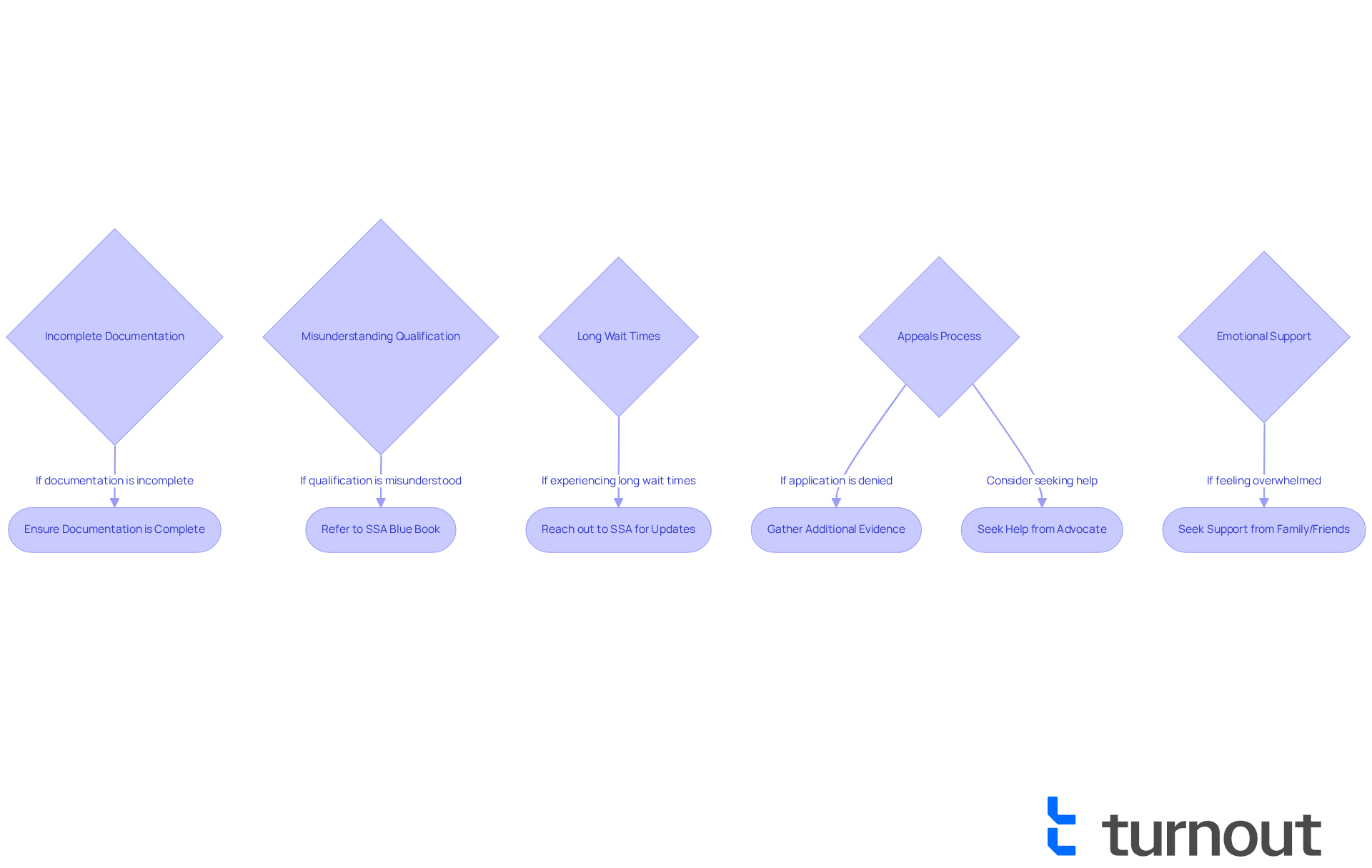Overview
The Social Security Administration (SSA) is taking a compassionate step forward by enhancing its Compassionate Allowances Program. With the addition of 13 new conditions, the program now includes a total of 300 eligible ailments. This change is designed to ease the burden on individuals grappling with severe health challenges, ensuring they receive the support they need more swiftly.
We understand that navigating disability claims can be overwhelming. By reducing documentation requirements and processing times, the SSA aims to provide timely financial assistance to over 1.1 million individuals facing life-altering health issues. This update not only streamlines the process but also emphasizes the agency's commitment to those in need.
If you or someone you know is struggling with these challenges, know that you are not alone in this journey. The SSA is here to help, ensuring that access to benefits is as smooth as possible. Together, we can work towards a brighter future for all affected.
Introduction
The Social Security Administration's Compassionate Allowances Program is a vital resource for individuals facing severe health challenges. It simplifies the often overwhelming process of obtaining disability benefits. Recently, the program has added 13 new qualifying conditions, evolving to meet the urgent needs of those with life-altering diagnoses. Yet, as the landscape of compassionate allowances changes, applicants may encounter new challenges and uncertainties.
We understand that navigating these changes can feel daunting. How can you effectively leverage these updates to secure the support you need? You're not alone in this journey; we’re here to help you find the guidance you deserve.
Understand the Compassionate Allowances Program
The Social Security Administration (SSA) is changing its compassionate allowances program, which is a vital initiative aimed at expediting the processing of disability claims for individuals facing serious health challenges. This program identifies specific diseases and situations that clearly meet the SSA's definition of disability, enabling faster approvals. By prioritizing these claims, the SSA significantly reduces the waiting time for applicants, often resulting in decisions within days rather than the typical months or years associated with standard claims.
For example, conditions such as Metastatic Endometrial Adenocarcinoma and Amyotrophic Lateral Sclerosis (ALS) qualify for expedited processing, allowing individuals to receive benefits swiftly. The average processing duration for special allowance applications is notably shorter, with many cases resolved within days. This rapid response is crucial for those confronting life-altering health issues, as it provides timely financial support during critical times.
Advocates emphasize the importance of the CAL program, pointing out that social security is changing its compassionate allowances program to alleviate financial strain and provide a sense of hope and security. Real-world examples underscore the program's effectiveness; over 1.1 million individuals with severe disabilities have benefited from this initiative, showcasing its positive impact on improving lives.
The CAL program is especially beneficial for those applying for Social Security Disability Insurance (SSDI) or Supplemental Security Income (SSI) benefits. It serves as a lifeline for applicants navigating the complexities of the disability system. While Turnout is not a law firm and does not provide legal representation, it offers access to trained nonlawyer advocates who assist clients in understanding their rights and the application process for SSD claims. Additionally, Turnout supports tax debt relief, further aiding individuals in managing financial challenges. By understanding and utilizing the Support Benefits Program, individuals can enhance their chances of obtaining the assistance they need when facing significant health challenges.

Explore Recent Changes to Compassionate Allowances
On August 11, 2025, the Social Security Administration (SSA) announced that social security is changing its compassionate allowances program by adding 13 new ailments to its Compassionate Allowances (CAL) list, which brings the total to 300 eligible conditions. This important update reflects the SSA's dedication to improving access to benefits for those facing severe disabilities. The newly included ailments, such as Rasmussen Encephalitis, Thymic Carcinoma, and Au-Kline Syndrome, are recognized for their debilitating nature, which justifies expedited processing for applicants.
We understand that navigating the complexities of disability benefits can be overwhelming. Over the past decade, the CAL initiative has evolved to address the urgent needs of individuals with life-threatening or profoundly disabling diagnoses, especially as social security is changing its compassionate allowances program. By including these new conditions, the SSA aims to reduce the burden of extensive medical documentation, allowing applicants to receive timely assistance. Since the CAL program began, over 1.1 million individuals have benefited from this expedited process, underscoring its vital role in supporting those in need.
SSA officials emphasize that the changes, as social security is changing its compassionate allowances program, are intended to enhance the overall responsiveness of the disability benefits system. The agency employs advanced technology to identify potential CAL situations and streamline claims processing, ensuring that individuals with qualifying circumstances can apply for benefits more efficiently. If you’re looking for a comprehensive list of the newly added requirements and more information about this special assistance program, please visit the SSA's official special assistance website. Remember, you are not alone in this journey—we're here to help you every step of the way.

Follow Steps to Apply for Compassionate Allowances
Applying for the Compassionate Allowances Program can feel overwhelming, especially since social security is changing its compassionate allowances program, but we're here to help you navigate this process with care and understanding. Follow these steps to ensure your application is complete and your needs are met.
- Determine Eligibility: First, confirm that your medical issue is listed on the special benefits roster, which you can find on the SSA's website. We understand that this can be a challenging step, but knowing your eligibility is crucial.
- Gather Documentation: Next, compile all relevant medical records that substantiate your diagnosis. This should include test results, treatment history, and any other pertinent documentation. Being organized can significantly reduce delays, as complete and accurate documentation is vital for a smoother application process.
- Complete the Application: Applications can be submitted online via the SSA's website, by phone, or in person at your local Social Security office. When filling out the application, clearly specify that your condition is on the Special Considerations list. It's common to feel uncertain about this step, but clarity can make a difference.
- Submit Your Application: Ensure that all required documents accompany your application. Incomplete submissions can result in delays, and we want to help you avoid that.
- Follow Up: After submitting your application, monitor its status. You can do this online or by contacting the SSA directly. Proactive follow-up is crucial for expediting the process, and we encourage you to stay engaged.
Since the beginning of the Support Benefits program, social security is changing its compassionate allowances program, which has helped over 1.1 million individuals with significant disabilities gain approval through this accelerated process. The typical duration needed to collect paperwork for compassionate aid applications can differ, but being systematic and meticulous can greatly minimize hold-ups. SSA Commissioner Frank Bisignano emphasized that social security is changing its compassionate allowances program by including new criteria to the supportive list, which assists more individuals with severe diagnoses in obtaining aid promptly. Remember, the Empathetic Support initiative seeks to expedite claims for individuals with serious health issues, so making sure your application is thorough and properly documented is crucial. You are not alone in this journey; we are here to support you every step of the way.

Overcome Challenges in the Application Process
While the Empathetic Benefits Program aims to expedite the application process, we understand that applicants often encounter various obstacles. Let's explore some common challenges and supportive strategies to help you overcome them:
- Incomplete Documentation: It’s essential to ensure that all medical records are comprehensive and well-organized. If the SSA requests additional information, respond promptly to prevent delays in your application.
- Misunderstanding Qualification: Even if your situation is not explicitly listed on the Support list, you may still be eligible for SSDI or SSI. We encourage you to refer to the SSA's Blue Book for a detailed list of qualifying conditions.
- Long Wait Times: Experiencing extended wait times for a decision can be frustrating. Consider reaching out to the SSA for updates. Maintaining open communication can help clarify any potential issues with your application.
- Appeals Process: If your application is denied, remember to remain persistent. You have the right to appeal the decision. Gather additional evidence and think about seeking help from a qualified advocate to strengthen your case.
- Emotional Support: We know that the application process can feel overwhelming. It's important to seek support from family, friends, or support groups to help manage the emotional challenges that may arise during this journey.
Statistics show that approximately 65 percent of initial Social Security disability applications are denied. This highlights the importance of thorough documentation and understanding the appeals process. Advocates emphasize that while social security is changing its compassionate allowances program, it’s crucial for applicants to remain vigilant and proactive in their approach to ensure their applications are successful. Remember, you are not alone in this journey—we're here to help.

Conclusion
The recent changes to the Social Security Administration's Compassionate Allowances Program signify a crucial step towards providing timely support for individuals facing severe health challenges. By expanding the list of qualifying conditions to 300, the SSA is enhancing its commitment to ensuring that those in dire need receive expedited processing of their disability claims. This initiative not only alleviates financial strain but also brings hope to countless individuals navigating the complexities of the disability system.
We understand that seeking assistance can be overwhelming. Throughout the article, key insights have been shared regarding:
- The importance of this program
- The newly added conditions
- The streamlined application process
The Compassionate Allowances Program has already benefited over 1.1 million individuals, demonstrating its effectiveness in delivering rapid assistance. Additionally, practical steps for applying and overcoming common challenges have been outlined, emphasizing the significance of thorough documentation and proactive communication with the SSA.
Ultimately, the Compassionate Allowances Program represents more than just a bureaucratic procedure; it is a lifeline for many facing debilitating health issues. As the SSA continues to refine this program, it's essential for potential applicants to stay informed and engaged. By understanding eligibility criteria and the application process, individuals can enhance their chances of receiving the support they need during critical times. Embracing these changes can lead to a brighter and more secure future for those affected by severe disabilities. Remember, you are not alone in this journey, and we're here to help.
Frequently Asked Questions
What is the Compassionate Allowances Program?
The Compassionate Allowances Program is an initiative by the Social Security Administration (SSA) aimed at expediting the processing of disability claims for individuals with serious health challenges. It identifies specific diseases and situations that clearly meet the SSA's definition of disability, allowing for faster approvals.
How does the Compassionate Allowances Program benefit applicants?
The program prioritizes certain claims, significantly reducing the waiting time for applicants and often resulting in decisions within days instead of the typical months or years associated with standard claims.
What are some examples of conditions that qualify for expedited processing under the program?
Conditions such as Metastatic Endometrial Adenocarcinoma and Amyotrophic Lateral Sclerosis (ALS) qualify for expedited processing, enabling individuals to receive benefits swiftly.
How long does it typically take to process applications under the Compassionate Allowances Program?
The average processing duration for special allowance applications is notably shorter, with many cases resolved within days.
Who benefits the most from the Compassionate Allowances Program?
The program is especially beneficial for individuals applying for Social Security Disability Insurance (SSDI) or Supplemental Security Income (SSI) benefits, providing crucial support during difficult times.
How many individuals have benefited from the Compassionate Allowances Program?
Over 1.1 million individuals with severe disabilities have benefited from the Compassionate Allowances Program, showcasing its positive impact on improving lives.
What kind of support does Turnout provide in relation to the Compassionate Allowances Program?
Turnout offers access to trained nonlawyer advocates who assist clients in understanding their rights and the application process for SSD claims, as well as support for tax debt relief.
How can individuals enhance their chances of obtaining assistance through the Compassionate Allowances Program?
By understanding and utilizing the Support Benefits Program, individuals can improve their chances of obtaining the assistance they need when facing significant health challenges.




